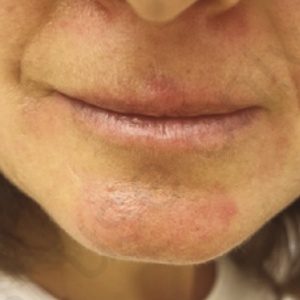Chronic recurrent urticaria in a patient with recurrent herpes labialis: complete remission after administration of aciclovir and antihistamines

Accepted: 30 December 2022
HTML: 17
All claims expressed in this article are solely those of the authors and do not necessarily represent those of their affiliated organizations, or those of the publisher, the editors and the reviewers. Any product that may be evaluated in this article or claim that may be made by its manufacturer is not guaranteed or endorsed by the publisher.
Chronic recurrent urticaria, occurring in the context of infections, represents a major challenge for clinicians. Chronic genital herpes infection has been perceived in the literature as a possible trigger of chronic recurrent urticaria. The administration of a systemic corticosteroid regimen in these cases has no long-lasting effect and the subsequent relapses are difficult to control. In these cases, treatment of the urticaria with antihistamine (as monomedication) is often not sufficient and does not suppress the symptomatology. The administration of acyclovir or valacyclovir according to a specific therapeutic regimen as monotherapy or in combination with antihistamine has been shown to be quite effective. The doses of this administration vary and can be tailored to clinical symptomatology. We present a 41-year-old female patient with chronic recurrent urticaria associated with angioedema and bronchospasm, in whom her herpes genitalis was found to be concurrent within the history and clinical examination. According to the history, the herpes was also recurrent and dated back about a year. Chlamydia trachomatis infection was also found, with serological findings corresponding to vaginal discomfort. Treatment with acyclovir 400mg thrice daily for an initial period of 7 days in combination with desloratadine 5mg daily was started as we observed complete remission of the urticarial rash. Due to worsening vaginal discharge, it was decided to temporarily discontinue systemic acyclovir therapy and treatment for the chlamydial infection was initiated with doxycycline 100 mg twice daily for 21 days. Already on day 1 after stopping acyclovir, a severe relapse with generalization of the urticarial rash was observed. Control of symptomatology was achieved by reintroduction of acyclovir according to the regimen in combination with antihistamine. Chronic infections are one of the common causes of chronic recurrent urticaria with a tendency to generalization and possible complications such as angioedema and bronchospasm. An academic, analytical approach to patients and the consistent exclusion of each possible trigger for chronic recurrent urticaria often guarantee the success of subsequent treatment.
Zawar V, Godse K. Recurrent facial urticaria following herpes simplex labialis. Indian J Dermatol 2012;57:144-5.
Zawar V, Godse K, Sankalecha S. Chronic urticaria associated with recurrent genital herpes simplex infection and success of antiviral therapy--a report of two cases. Int J Infect Dis 2010;14:e514-7.
Khunda A, Kawsar M, Parkin JM, Forster GE. Successful use of valciclovir in a case of recurrent urticaria associated with genital herpes. Sex Transm Infect 2002;78:468.
Shelley WB, Shelley ED. Acyclovir therapy for angioedema and chronic urticaria. Cutis 1997;59:185-8.
El Sayed F, Marguery MC, Periole B, et al. Urticarial manifestations associated with herpes simplex virus type 2. Genitourin Med 1995;71:196.
Copyright (c) 2023 the Author(s)

This work is licensed under a Creative Commons Attribution-NonCommercial 4.0 International License.
PAGEPress has chosen to apply the Creative Commons Attribution NonCommercial 4.0 International License (CC BY-NC 4.0) to all manuscripts to be published.





 https://doi.org/10.4081/dr.2023.9635
https://doi.org/10.4081/dr.2023.9635



